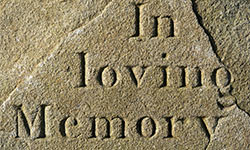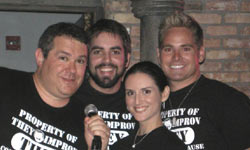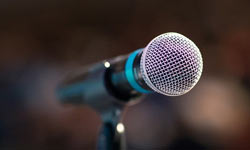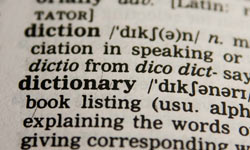These are some commonly used comedy terms:
ad-lib - a line that is made up on the spot during scripted material.
beat - this has two meanings. Either it can be used to describe a section of material (see "bit" below) or mean to take a a pause for some comedic effect.
behavioral jokes - using non-verbal elements to comedic effect. This often uses emotions, character elements, body language or sound effects. Think of Richard Pryor walking as if he were white, etc.
bit - this has two meanings. It is a section of material, or a part of a section depending on context. It may also mean an entire self-contained comedic piece with its own purpose.
blue - "dirty jokes". Material with a lot of sexual material, "potty humor" or inappropriate language for its own sake.
bomb - to fail in a comedic performance.
booker - someone who hires comedians to perform.
callback - making reference to earlier material.
capper - the last topper (see below), geared towards getting the biggest laugh.
catch phrase - phrase designed to be a trade mark, something that the audience will remember the comedian for.
closer - the final joke in a set.
creative misunderstanding - a purposeful mistake in the interpretation of an idea for a comedic effect
dying - similar to bomb, except currently in the process of bombing.
Emcee or MC - introduces the performers and hosts the evening.
gag - a joke.
gag file - a file or journal of jokes to be used in the future or to develop material.
get it - often used to describe the understanding of a joke.
headliner - the star of a larger show. The "name" that is used to sell an evening of comedy. Usually performs last.
heckler - someone who interrupts, usually by shouting insults.
inside joke - a joke targeted to only a few people in an identifiable group. Others would not have the information to "get" the joke.
joke file - a file or journal of jokes to be used in the future or to develop material.
killing - to perform extremely well. The opposite of dying.
line-up - a list of pieces to be performed (improv) or the comics set to perform.
long form - collection of improvised scenes or games based on a single audience input.
LPM or laughs per minute - a theoretical measurement of how quickly the laughs come during a show. The idea being that the more LPM, the better the performance. A set with a low LPM would have to get more tight.
mic - abbreviation for microphone.
on the road - traveling to perform.
one-liner - a quick joke.
one-nighter - a one night gig.
open-mic night - a night that allows anyone to get on stage.
opener - the comedian that is first, or opens the show in a line-up.
opening line - the first line of a routine.
POV - point of view.
premise - the central concept to a routine.
punch line - the line that is supposed to derive the laughter from the audience.
regular - local comedian who appears regularly.
reveal - that which exposes the creative misunderstanding or humor.
running gag - a recurring bit that repeats often during a routine.
scene - a single location and scenario that two actors perform within.
set - a stand-up comedy routine of any length.
short-form - a single scene or game performed in an improvisational show based on an audience suggestion.
showcase - a performance offering exposure to its performers (often instead of compensation).
sketch - a prepared scene for comedic material to be presented in a theatrical setting.
skit - a sketch, but with a slightly less professional connotation.
stage time - the amount of time on stage a performer has.
tag line - the final line of a comedic setup. Usually a line that leads to the end of a bit and allows the moving on to the next piece.
topical humor - jokes about current events.
topper - a gag playing off a previous gag. These top one another building on laughter leading to the capper.




